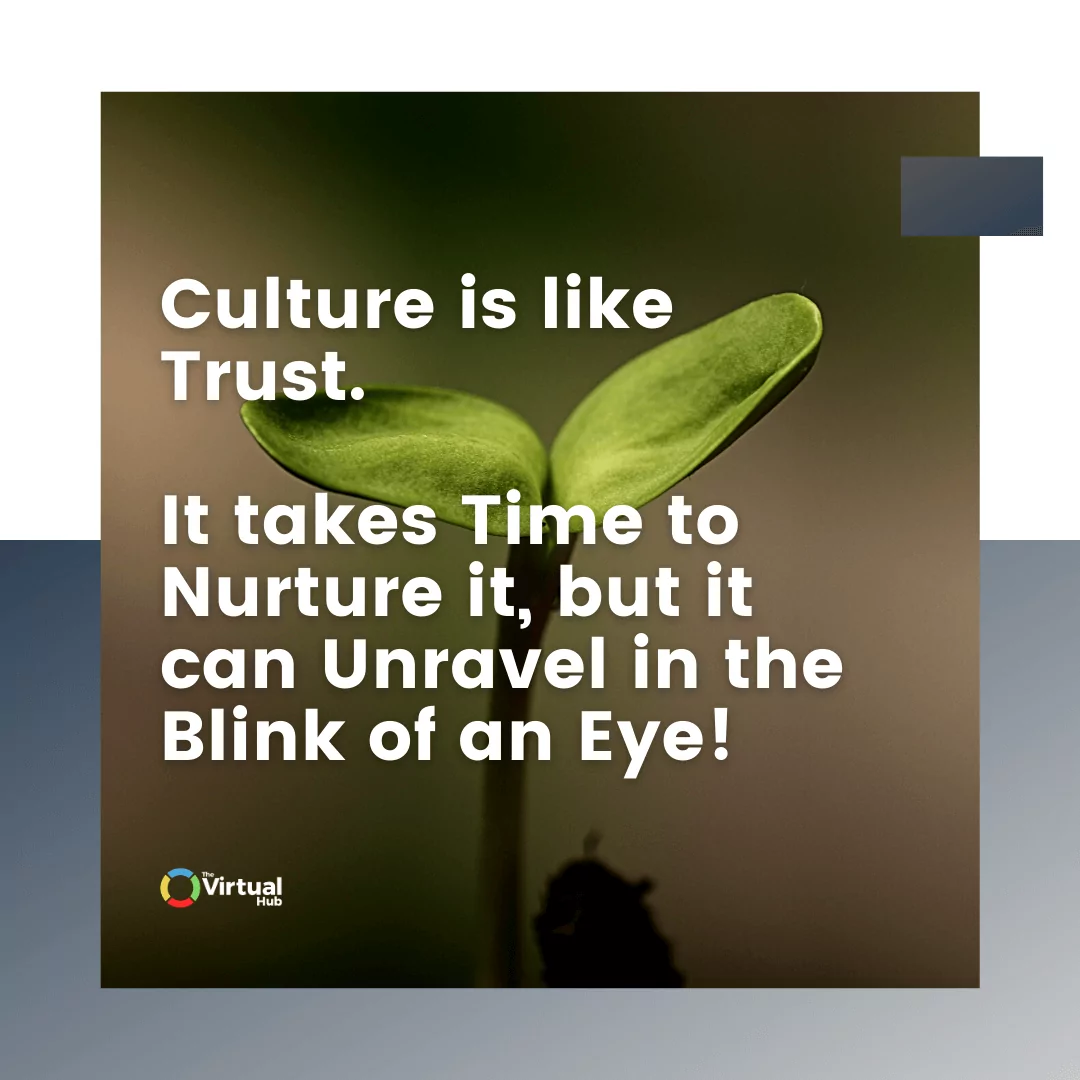Authored by: Barbara Turley, CEO - The Virtual Hub
"Culture eats strategy!"
I’ve heard that said many times and found myself nodding my head in agreement. It’s only now I realize that, while I agreed, I really had no basis for my agreement aside from it sounding like a philosophy I would like to think I subscribed to. After all, culture is people (isn’t it?).
‘Culture’ is so hip and current whereas ‘strategy’ feels so 1980’s, complete with brash lipstick and shoulder pads. The corporate raiders of the 1980’s were all about strategy with seemingly little care for the people (or the planet!).
Basically, I was clueless as to how powerful a statement like ‘Culture eats strategy’ is. Especially when your back is against the culture wall.
Today, having come through the COVID firestorm, I am learning to look deep into every philosophy and statement. I’m learning to look at things more objectively and ask if something is really true … or just a great piece of copy!
In my last post in this ongoing ‘COVID 19 survival series’, I talked about our company’s Purpose and how our participation in Verne Harnish’s Scaling Up program this year shined a very big light on areas like our core values, our purpose and our culture.

Through us doing the Scaling Up “5 Whys” exercise, we updated both the client-centered and employee-centered aspects of our business purpose. It was powerful and it reignited our passion and drive to keep going.
However, purpose is only one element of a company’s core, and a strong company core is the foundation you need to build an effective workplace culture.

But what exactly is a good company culture and why is it important?
We needed to take a step back and consider whether or not our purpose and cultural values were 1) truly what we aspired to and 2) were still working for us.
Let’s take a quick look at what we discovered.

The Importance of Organizational Culture
You can click on these links below to jump to a specific topic:
- About Organizational Culture
- Organizational Culture and Leadership
- Why Organizational Culture Is Important
- Qualities of a Successful Organizational Culture
- How to Build a Winning Organizational Culture
- Our Culture Crisis
- Culture Is Like Trust
- Adding to Our Cultural Toolkit: Core Values
- Culture in Practice
- The Value of Shared Leadership
About Organizational Culture
So, what exactly are we talking about?
I think it’s fair to say that most people have a tacit understanding of what a company’s culture is--it’s the atmosphere, the feeling, the vibe you get from the overall people experience in an organization.

Because organizational culture is so powerful, it can have a big impact on employee engagement. Employees who feel that their company's culture is aligned with their own values and beliefs are more likely to be engaged in their work. On the other hand, employees who feel that their company's culture is at odds with their own values are less likely to be engaged.
Everyone “knows” what it is, and most of us have experienced both good and bad--or even great and “toxic”--organizational cultures. But despite the fact that a strong company culture is viewed as being critical for business success and it’s considered to be a common element among great companies, there’s no agreed upon definition of culture!
Organizational Culture and Leadership
The late management guru, Peter Drucker, once said that culture eats strategy for breakfast. By this, he meant that the internal workings of a company will have a greater effect on its success than any externally focused strategy. And he’s not wrong!
A company’s culture really is the engine that drives everything else. It starts at the top with your leadership team and extends to every single employee. Corporate culture defines how things are done around there, what values are important, and how people treat each other--just to name a few elements.
When you get it right, a great organizational culture can be an incredible competitive advantage. Healthy cultures attract and retain the best talent, promote creativity and collaboration, and engender customer loyalty.
On the flip side, toxic and weak cultures can be disastrous. They create a working environment of fear and mistrust, stifle innovation and collaboration, and drive away top talent.
Why Organizational Culture Is Important

Since culture appears to defy explanation, let’s instead consider what it looks like when a company has a good culture.
A strong organizational culture is one where employees look forward to work, enthusiasm is sustainable, and the team is happy. That is, where there’s great culture, the company runs as a team, not merely a collection of individuals.
A positive organizational culture has the following advantages:
- reflects your brand identity
- helps you attract and retain top talent
- inspires employees to do their best work, improving employee performance and workforce engagement
- promotes positive employee experience
- improves your recruitment efforts
- instills a sense of pride in being part of your organization
Bottom line: A strong culture makes working more pleasant for you and your team and has a significant impact on your revenue growth.
Bottom line: A strong culture makes working more pleasant for you and your team and has a significant impact on your bottom line.

Qualities of a Successful Organizational Culture
So, if there’s no real agreement on what organizational culture actually is, how do we know if we have a good one or not?
Fortunately, there are some common themes that seem to emerge when experts try to pin down the qualities of a healthy organizational culture. Here are just a few:
- There's alignment between the company’s purpose, mission statement, vision, and the day-to-day reality.
- Employees feel like they are part of something larger than themselves and their individual roles.
- The environment supports risk taking and creativity.
- Feedback is timely, honest, and helpful.
- Mistakes are seen as learning opportunities.
- There's focus on continuous improvement.
How to Build a Winning Organizational Culture
Building high-performing organizations doesn’t happen by accident and isn't created overnight. It takes intentionality, hard work, and commitment to continuous improvement. Here are a few things you can do to get started:
- Define your company’s purpose, mission statement, and vision, and make sure they're reflected in everything you do.
- Clarify your company's core values and make sure they're embodied in your behavior and decision-making.
- Build trust by being transparent, honest, and authentic in all your interactions.
- Encourage employees to communicate and provide feedback.
- Promote a learning mindset and provide opportunities for growth and development (such as leadership training).
- Foster a positive work environment that's fun, supportive, and respectful.
- Reward and recognize employees for living your company values and contributing to your organization's culture.
- Invest in leadership development at all levels.
- Commit to continuous improvement and make sure everyone in your organization is bought in.
RELATED: 4 Ways To Build A Positive Work Culture With Your Virtual Team
Our Culture Crisis
When I first founded The Virtual Hub, our virtual assistants worked from home, but it didn’t work very well, at least not for us as a company. It was ok until we got to about 30 people and then it became nothing short of a nightmare to manage.
So after two years, I invested in office space and equipment and converted from a remote to a co-location model. And I must say, we created a rockin’ culture in the office at The Virtual Hub. We became known for our collaborative, supportive, enthusiastic, and fun culture.
That became a magnet in itself for new employees.
Under the work-from-home beginnings, The Virtual Hub was a good business with a good culture, but it became a great business with a great culture as an in-person company. I absolutely believed our culture was strong and resilient enough to withstand a temporary disruption when pandemic driven stay-at-home orders were first issued.

However, in truth, we all got badly blindsided. While we were all head down frantically sorting out logistics and saving the ship from sinking, angst and unhappiness were rising amongst our people. Our culture turned its back on us in an instant. At least in part.
Culture Is Like Trust
Although many of us may believe that “everyone” wants to work from home and an internet search for “work from home” will get you 7 billion results, that’s not actually the case.
Many people prefer an office environment to the isolation and loneliness of working at home. Plus, working from home can have drawbacks, such as additional interruptions from family members or roommates and feeling like you’re “at work” 24 hours a day.
Though many salaried office staff take work home from time to time, work in an office typically has a clear cut-off time, and leaving the office provides a stronger cue that says “done” for the day than closing your laptop and walking into the next room does.
In shifting from office to remote, literally overnight, we should have better anticipated the culture shock (Thanks Harry Hindsight for that biz tip!). Overnight, the team went from an engaged, dynamic, team-centered, in-person environment to total isolation from one another, with sub par equipment (or just none), cramped and hot work spaces at home, and very dodgy internet.

Even though we have all the tech tools needed to maintain strong connection even when we’re apart--chat software, zoom calls, etc.--our day-to-day operations and work environment were completely changed in an instant.
To make matters worse, a lot of our team felt angry or left behind simply because the speed of the move was so intense and chaotic. Those that had no equipment or internet issues had to leave the office last (we’re talking 24-48 hours later here!). Then came the toddler like jealousy as other companies rolled out computers and other payments in the move home. Those losing jobs were simply forgotten.

Within a few weeks, everyone realized this was going to go on for an indeterminate length of time. Everyone wanted a crystal ball and to know definitively what the company was going to do.
The truth was, we just didn’t know what to say, or do. But we knew we had a major issue. Finally, I broke down in tears as the resignations started and anger mounted.
Culture is like trust. It takes time to nurture it, but it can unravel in the blink of an eye!
This is the situation we found ourselves in. It has forced us to learn how to develop and strengthen our culture as a remote team. We know many other businesses are finding themselves in the same boat.

"Whatever you’re planning for right now, or whatever your “bootcamp” is, do not miss out on the opportunity to get your team involved."
Adding to Our Cultural Toolkit: Core Values
Once we solidified our new company purpose, giving us our first piece of information about what specifically we’re going to scale, defining our core values was our next step. Our company's values helped us define what the experience of pursuing our purpose together is going to look and feel like.
To create the core values, we involved people throughout the organization. And to determine what would really, accurately reflect what The Virtual Hub is all about, we came up with the values most important to us by completing “a mission.”
For this exercise, each person had to decide which of their team members they’d take with them on this imaginary mission. That is, we had to select someone who’s the epitome of The Virtual Hub--the individual most associated with doing a great job and having tons of enthusiasm for our work.

The idea was that, in order to be successful on your mission, you’d want to have the most “Virtual Hub-iest” person as your mission partner (Let’s call that your MVP). After we picked our TVH MVP, everyone wrote down the values their MVP embodied, based upon how they behaved in their role.
Once everyone had picked their MVP and identified the values that individual represented, we all compared notes to find the common denominators. From this information, we were able to distill what’s at the core of THV--our company DNA--into six core values.
Culture in Practice
The best part of doing this exercise with the team was that we not only came up with values we could use to shore up our culture; involving the team in the process was a demonstration of the kind of collaborative culture we want to have. Like we’d build trust, we were building culture by including cross-sections of the people who'll benefit from having a strong and healthy culture.

Whatever you’re planning for right now, or whatever your “bootcamp” is, do not miss out on the opportunity to get your team involved. As the leader of TVH, this process of “doing” Scaling Up as our bootcamp with other members of my team and including more team members in the activities needed to work through the program has been invaluable.
For one, it took a weight off of my shoulders because I didn’t have to figure out everything on my own. (Have I mentioned my decision and resilience fatigue?!) Also, it’s allowed me to be vulnerable with my team. Not in an uber-personal blubbering mess way, but by showing your team that you don’t have all the answers and that you and they are interdependent demonstrates your respect for them.
The Value of Shared Leadership
Finally, you’ll find that it’s incredible how team members will show up and step up to lead. Emerging leaders are born in times like these.
When I revealed that I didn’t know what to do over certain aspects of the business, my team told me, “We know what to do.” And of course they do! They’re the ones with their fingers on the pulse of the operations. I completely trust that they know what to do in areas where I do not.

Empowering them to take the lead and come up with solutions demonstrate my trust for them. Typically, when trust is granted, it’s also earned.
It might feel weird at first to share leadership responsibilities with your team, but it’s one of those paradoxes of life, where it feels like one thing but the opposite actually results.
As I explain in my delegation training masterclass, business owners are often reluctant to hand off tasks to a virtual assistant or other team member because they feel like they’re losing control over the process. In reality, delegating lower-level tasks to another person on your team gives you more control over your business because it allows you to spend more time focused on your “genius” work and to have the bandwidth to see the big picture of your company.
Sharing responsibilities with your leadership teams will permit you to more quickly adapt as we continue to move through the economic/global issues and anticipate what comes next.

Final Thoughts

The world has changed and will continue to change. There's no stopping it and there's no way to know exactly what will happen next, but what we can control is how our businesses operate and the kind of culture we create for our teams.
If you’re feeling lost or uncertain about what to do in your business right now, take some time to invest in your company culture. It'll be worth it, we promise!
